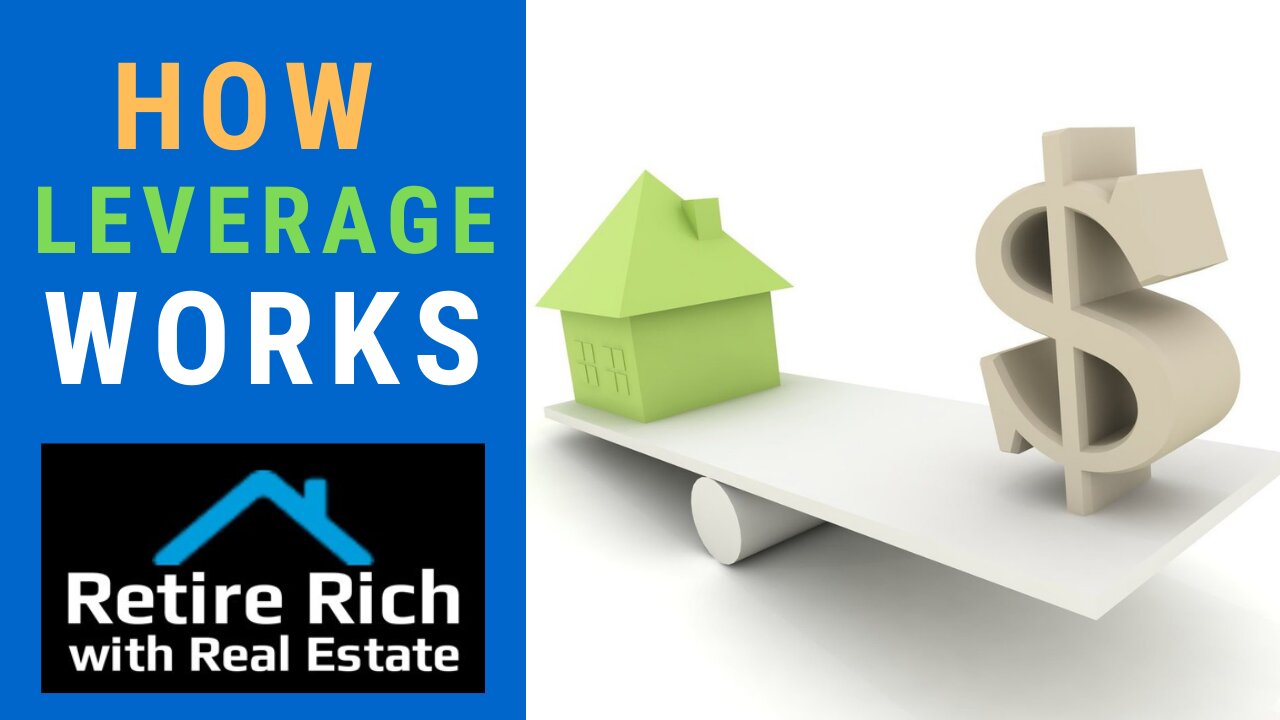Premium Only Content

How Leverage Works
How Leverage works, the benefits of using leverage, and the potential pitfalls. Leverage is the use of financing to borrow capital for investment, with the expectation that multiplying the risk-reward relationship of the investment will create more potential profit. In other words, the more money you invest, the more risk you have and the larger the reward (profits) you receive, if all goes as well with your investment.
The difference between paying cash and financing
Let us assume you have $100,000 to invest and want to purchase a rental property. You find a rental property for $100,000 and you decide to finance that property with a 20% down payment at 5% interest. If that property rents for $1,000 per month, it is making a 12% gross annual return. After you deduct the mortgage interest you are making a net of 7%. That’s a pretty good return and you didn't have to spend the full $100,000 to get it either. You only spent $20,000 out of pocket for the down payment. Thus leaving you with $80,000 cash left to invest in other properties. Assuming you could repeat the example above you could purchase 5 properties using financing and your $100,000 cash. Giving you a gross income of $60,000 per year and a net income of $35,000 after mortgage interest.
If you pay cash to buy one property you’ll have to spend all of your $100,000 and you’ll make 5% more profit per year because you don’t have a mortgage. Now here is where the leverage kicks in, on the cash deal you have a $12,000 per year rental income, which is a 12% return vs. 7% per house in the 5 house deal. But financing 5 houses using the $100,000 as a down payment (5 x $20k) gives you a $35,000 per year rental income or 35% return. So using leverage in the scenario gives you almost 300% more income!
Mortgages are usually some of the cheapest money you can borrow because the loans are backed by the asset of real estate. Mortgage rates are currently at historically low rates. If you choose to finance, I would only finance properties with a fixed-rate mortgage. The advantage of financing real estate with a fixed-rate mortgage is the rate is locked in and cannot be raised for the term of the mortgage. Another great advantage is you also have the ability to refinance if the interest rates go down or keep the lower rate if rates increase. So they are win-win. Variable-rate and interest-only mortgages might be available at slightly cheaper rates, but the risk of the rate increasing as the loan matures is much higher. For that reason, I would avoid these types of mortgages.
#HowLeverageWorks #UsingLeverage #LeverageVsPayingCash
HTTP://www.retirerichwithrealestate.com
Chapters:
0:00 - Start
0:34 - Intro
1:00 - Using Leverage Vs Cash
2:40 - Mortgage Rates
3:34 - Appreciation
4:15 - Leverage Example
4:40 - Leverage Chart 1 Finance vs 1 Cash Deal
6:33 - Leverage Chart 5 Finance Deals vs 1 Cash Deal
8:50 - Cash Flow is King
9:32 - Most People Don't Have the Cash
10:26 - The Benefits of Using Leverage
10:48 - Negatives of Using Leverage
11:20 - Conclusion
12:26 - Outro
-
 5:00
5:00
DrArtsHotRodRehab
4 years agohow Google search Works
111 -
 1:59
1:59
Creation Ministries International
4 years agoHow radiometric dating works
121 -
 11:37
11:37
tactical_rifleman
2 days agoRare Breed BEATS THE ATF | FRT-15 | Tactical RIfleman
62.9K22 -
 LIVE
LIVE
Pepkilla
2 hours agoMore GOLD Camo's PLEASE Grind Call Of Black Ops 7
145 watching -
 1:35:54
1:35:54
LexTronic
2 hours ago $0.19 earnedMetroid Prime Remastered
2.73K -
 12:32
12:32
MetatronGaming
17 hours agoBLIGHT looks AMAZING - Trailer Reaction
20.2K10 -
 LIVE
LIVE
ProRedmanX
1 hour ago $0.21 earnedSunday Morning Coffee & Chaos ☕ | PUBG -> BF6 -> ??? #goonsquad
61 watching -
 5:23
5:23
Memology 101
22 days ago $14.21 earnedReporter HUMILIATES Kamala Harris over "WORLD-CLASS" dodge during interview
20.6K47 -
 LIVE
LIVE
ItsJustChrisTV
1 hour ago $0.19 earnedRescue Rangin'! Lets (try to) Save Some Folks!
77 watching -
![[Arc Raiders] Time for Some Keys, Increase This Stash, Scrappy and Tables Are All Max. Time for More](https://1a-1791.com/video/fwe2/ac/s8/1/4/g/x/C/4gxCz.0kob-small-Arc-Raiders-Time-for-Some-K.jpg) 1:11:44
1:11:44
Palermozeto
1 hour ago[Arc Raiders] Time for Some Keys, Increase This Stash, Scrappy and Tables Are All Max. Time for More
1.77K